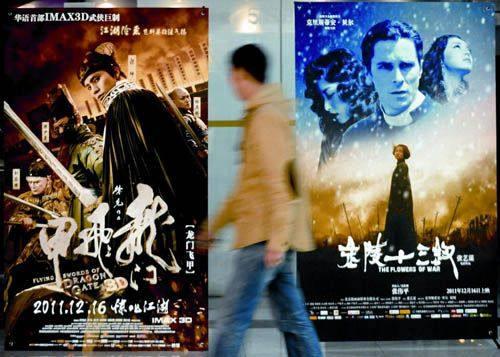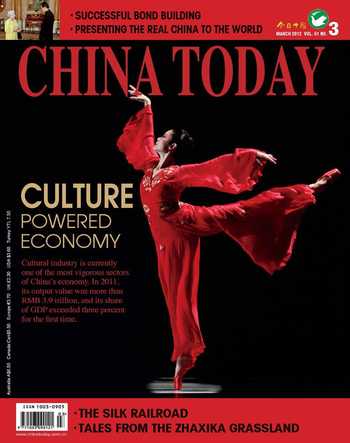China’s film industry on the up and up

THE New Year period is a good time for filmmakers in China. Scores of movies premiere during the festive season, which lasts from December to February –competition is fierce and box office receipts pile up.
Boom Time
Zheng Gang, now in his forties, waxes lyrical about the films he watched as a teenager. At that time in his hometown in Shanxi Province, north China, Zheng Gang would often sneak off to a dilapidated auditorium that had been transformed into a makeshift movie theater to watch his favorite stars on the big screen. Zheng recalls the piles of discarded candy wrappers strewn in the hall and how staff would use megaphones to hush the audience
Moviegoers didnt mind the poor condition of theaters since watching a film was considered the height of luxury 30 years ago in China. When the Japanese blockbuster, Manhunt (Kimi yo fundo no kawa wo watare) hit local screens, Zheng Gang, 16, watched it six times in a single week. The Shaolin Temple, which is credited with starting the Kung Fu revitalization on the mainland, also made a deep impression on him. The film had such an impact that reports of teenagers leaving their homes to learn martial arts at the Shaolin Temple in Henan Province were common.
“It cost me just RMB 0.1 to watch The Shaolin Temple in 1982,” recalls renowned Chinese economist Lang Xianping.“But in 2007, I spent RMB 80 to watch Transformers.” Lang points out in one of his essays that ticket prices in China have soared by a multiple of 800 in the last 25 years. Although many people agree this increase is excessive, it seems it hasnt impacted on the upsurge of box office receipts in China.
The market for films in the Middle Kingdom is large and growing. Box office revenue exceeded RMB 10 billion in 2010, a 60-percent increase over the previous year. In 2011, revenue continued its upward trend, recording a 30-percent increase to exceed RMB 13 billion.
Chinese filmmakers expect annual box office receipts of RMB 20 billion in the near future. Han Sanping, a film industry heavyweight and chairman of China Film Group Corp, is even more confident about the industrys growth prospects, forecasting a future annual box office of RMB 40 billion. This may sound overly optimistic, but it is a realizable figure in the long run.
China has seen a significant uptick in film infrastructure development. In 2010, 4.3 new movie screens were opened daily. In 2011, the figure reached eight. The total number of movie screens in China surged from 6,200 in 2010 to nearly 10,000 by the end of last year.
“Chinas film industry has entered a stage of rapid growth,” said Wang Yunping, a researcher with the National Development and Reform Commission of China. Since 2003, when more reforms were launched to help the industry, boxoffice receipts have shot up at an annual rate of 30 percent on average. This has defied world trends, Wang says.
Newly
installed screens Total box office revenue
Blockbuster Bonanza
In the early 1990s, Chinas film industry made hardly any progress at all. By the mid-90s, filmmakers saw the potential in the market and were eager to rejuvenate the industry. It was one auction that changed everything.
In 1995, film director Ye Daying was planning to release his new production Red Cherry, but was rebuffed by distribution companies in 19 provinces and cities. Eventually, Beijing-based New Film Association Co., Ltd. came to Yes rescue and decided to auction the movies premiere rights. According to Gao Jun, vice general manager of New Film Association Co., Ltd., films can be auctioned in the same way as antiques and artworks. Gao took charge of the auction in 1995 and clearly remembers the day Beijing Geology Hall Theater submitted the final bid for a nine-day premiere stint at RMB 520,000.
The film brought in a profit of RMB 880,000 for the theater. The price of the films subsequent rights rose immediately. Jiangsu Film Distribution and Screening Company, having once refused the rights to Red Cherry at RMB 280,000, then had to spend RMB one million to buy them. Red Cherry, made on a budget of RMB 17 million, went on to gross over RMB 60 million in the domestic market. This represented a high water mark for Chinese films.
Inspired by Hong Kongs “New Year movie season,” Gao Jun, along with Zhang Heping, founder and general manager of Beijing Forbidden City Film and TV Distribution Co., Ltd., and Wang Zhu, deputy director of Beijing Municipal Bureau of Culture, decided to introduce the concept to the mainland film market.
“Before 1995, most movie theaters on the mainland would close during the Spring Festival. It was considered a bad time for releasing a film,” Gao Jun says. That belief was shattered by Jackie Chans Rumble in the Bronx, released during the Spring Festival in 1995. The film pulled in RMB 110 million on the mainland. Nevertheless, Gao Jun and other filmmakers regarded Rumble in the Bronx as an accidental success until another Jackie Chan film, First Strike, grossed over RMB 80 million during the next years Spring Festival.
In 1997, the New Year release of Feng Xiaogangs Dream Factory was deemed a test case for the mainlands filmmakers. To the delight of industry players, the comedy raked in RMB 11.5 million in Beijing alone, handsome proceeds indeed for a movie with a budget of RMB 4 million.
In the next two years, Beijing Forbidden City Film and TV Distribution Co., Ltd. successively produced and marketed Be There or Be Square and Sorry Baby, setting a solid foundation for the development of Chinese New Year blockbusters.
Today, the New Year movie season in China has grown into a mature and reliable market for film releases. Box office revenues for the month of December 2010 alone hit RMB 1.2 billion.
Gao Jun says tailor-making films for the New Year period is a milestone in the progress toward realizing the full potential of Chinas film industry. Hong Kong film director Peter Chan agrees that boosting releases in the New Year season is important for the further development of the industry. “Holidays are always the ideal time to release films. Building a holiday film culture in the New Year season should boost audience numbers at other times as well.”
At present, the four “golden” movie seasons, namely New Year, the Labor Day (May 1-7) holidays, the school summer vacation period and the National Day (October 1-7) holidays all see large numbers of moviegoers. Over 50 percent of annual box office revenue in China is generated during these holiday periods.
Chinas film industry is booming and keeps churning out big hits. Feng Xiaogangs Aftershock pulled in RMB 500 million in just 17 days. Love Is not Blind, a low-budget domestic production, beat Hollywood blockbusters to reach the RMB 300-million mark 16 days after its release.

Crouching Tiger, Leaping Dragon
In 1993 China launched reforms in the film industry to thoroughly remold old production paradigms and planned-economy film distribution techniques. Since 1994, China Film Group Corp. has imported ten overseas blockbusters every year. The Fugitive, its first imported crowd-pleaser, garnered a domestic audience of 1.39 million and box office receipts of RMB 11.27 million on its one-week-long first run in six major cities including Beijing and Shanghai.
Hot on The Fugitives heels came other popular foreign films, mostly from Hollywood, such as Titanic, installments of the James Bond 007 franchise and the Pirates of the Caribbean series. In the first few years of overseas blockbusters prevalence on Chinese screens, they took in up to 80 percent of Chinese domestic box office revenue each year.
At the same time, domestically made films were taking great strides to catch up to their foreign competition. Hero, released at the end of 2002, appealed to local audiences by assembling a cast with Chinese stars from the mainland, Hong Kong and Taiwan. It went into history as being the first mainland production to auction its VCD and DVD rights and spent a record RMB 10 million on promotion and marketing. By virtue of the interest in Far East culture aroused by Crouching Tiger, Hidden Dragon, Hero was also well received in foreign markets with total overseas box office receipts topping RMB 1.1 billion. Filmmaking subsequently became recognized as a lucrative new growth industry ripe for investment.
Heros success encouraged Chinese directors to produce a series of films in a similar style. The Promise, The Banquet and Curse of the Golden Flower generated considerable box office revenues despite being widely criticized for their unoriginality and poor filmmaking.
In 2004 for the first time domestic films outperformed im- ported blockbusters in terms of revenue, pulling in 55 percent of the RMB 1.5 billion in ticket sales at Chinese theaters for that year.
“The fast development of the Chinese film industry has attracted the attention of overseas directors and producers. In their eyes, Chinas movie market is a potential gold mine,” Gao Jun said. “Just five or six years ago, annual box-office revenues on the mainland were less than RMB 1 billion. In 2011 the figure stood at RMB 13 billion. Such growth is found nowhere else in the world.”
China now produces over 500 films per year – five times the amount of five years ago. The country is now the worlds third largest player in terms of number of films produced on a yearly basis, trailing India and the U.S.
Domestic filmmakers are gradually moving away from the idea that waiting for ticket sales is the only way to recoup a movies production and marketing costs. “We are starting to recognize that there are different ways to get returns on our investments. For instance, royalties from audio, video and multi-media rights can add up,” Gao Jun says.

Eyes on the Globe
The sharp increase in the number of movie theaters and movie screens is regarded as one of the main drivers of development in Chinas film industry.
Nevertheless, some experts assert that the number of movie screens built so far is still inadequate. According to film director Yin Li, there are only 10,000 movie screens in China for a population of 1.3 billion. By contrast, the U.S. has 40,000 screens for 312 million people. Yin says a huge distribution market is also yet to be tapped.
Although the number of movie screens is on the rise, the appeal of film doesnt seem to be broadening as fast as it should. The growth in the number of filmgoers in China has actually been slowing down for a number of years now. In the early 1980s, Chinese people made tens of billions of visits to movie theaters every year. By 2010, this had declined to 250 million individual viewings. The steep fall can be probably attributed to ever increasing ticket prices. When Dark Side of the Moon, the third installment in the Transformers series, was released in the mainland, the ticket was priced at RMB 180 at some Imax theaters. Scalpers were reported as reselling these already heftily priced tickets for as much as RMB 400.
In Las Vegas in March 2011 at the opening day of CinemaCon, the annual gathering of theater owners hosted by the National Association of Theater Owners, Millard Ochs, president of Warner Bros. International Cinemas, predicted that Chinese box office revnues would surpass those of the U.S.s within 10 years. However, his prediction was contended by Chinas netizens who pointed out that high ticket prices and poor quality production hamper the widening of cinemas appeal in China.
In the China Film Industry Report 2011, the China Film Association predicts the country will become the worlds second largest film market within five years. Despite this rosy forecast, insiders say there is still a long way to go if the Chinese film industry is to become globally influential and competitive. Quality management needs to be improved, box office statistics are yet to be made more transparent, and the presence of Chinese productions in foreign markets is still low.
The cost-returns ratio of Chinese films is still below the levels in many countries. The domestic industrys investment in filmmaking accounts for only 2.09 percent of the world total, and its share in global box office revenues is even lower. In contrast, U.S. films, which attract 52 percent of global investment, pull in 93 percent of worldwide revenues.
Looking ahead, Bona Film Group Corps Chairman and CEO Yu Dong suggests Chinas filmmakers have an open mind and will widen the scope of their productions to penetrate overseas markets. China might not have developed its own Hollywood just yet, but dont be surprised to see more Chinese blockbusters heading to a theater near you in the near future.

